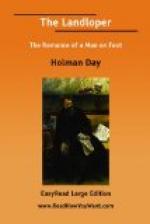“Well, what’s the answer?” scoffed Boston Fat.
The other man talked on, humor in his eyes, plainly enjoying this verbal skylarking.
“I’m afraid I cannot waste time and breath on you in an attempt to answer the riddle of the ages, to explain the wanderlust that sent forth the tribes from the Aryan bowl of the birth of the races, my corpulent bean-pot. Your blank eyes and your flattened skull suggest a discouraging incapacity for information.”
“I don’t know what you’re gabbing abut. But there’s one thing I do know. I’ll tip ’em off at the next insane-asylum I come to that I met you headed north.” The tramp gathered the articles of clothing from the bushes and got down on his knees and began to fold them.
The man of the brown eyes stepped forward, laid down his little book, picked up the frock-coat and pulled it on, the fat man squealing expostulation. With serene disregard of this protest Farr buttoned the coat, smoothed it down, and then straightened his shoulders.
“You may see that it was built for a gentleman and that it fits a gentleman, friend pork-barrel.”
“You shuck it off and pass it over, that’s what you do,” yelped the tramp. “It’s my coat.”
“It was perfectly apparent that it was not your coat when you tried it on.”
“I tell you I found it hanging on a fence-post just above here.”
“That was merely by accident, and you should have passed on and left the garments for one whose frame was fitted to wear them. You illustrate the curse of modern society. Men are so filled with the greed of getting that they grab misfits simply out of passion for possessing.”
“I’ve stood your slurs ever since I got here, but I’ll be jobeefed if I’ll stand for your swiping my property.”
The man of the brown eyes smiled. His whole demeanor showed that he was more than ever hugely enjoying his own verbosity—the florid language which was both maddening and mystifying the tramp.
“Further evidence of your mean nature: a gentleman resents an insult that steals away his character much more quickly than he resents an act that steals mere property. In that little book which I have just laid down Shakespeare speaks trenchantly on that matter: ’Who steals my purse steals trash . . . but he that filches from me my good name robs me . . . and makes me poor indeed.’”
The tramp gave over his work of folding, and awkwardly and cumbersomely got upon his feet.
“You take off that coat and hand it over. It’s mine—I found it. I can stand a crazy man’s gab, but when any one tries to do me out of what’s my own I’ll fight.”
“May I ask what you’re going to do with these garments of a gentleman which have fallen into your hands by accident?”
“I’m going to cash ’em in at the nearest second-hand shop, that’s just what I’m going to do.”
“Just as you sold the Sunday suit you stole from a poor man! My friend, I was insulted that day on account of you. You owe me something!”




